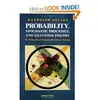- Editorial:
- SPRINGER VERLAG
- Materia:
- Ciencia - STEM
- ISBN:
- 978-0-387-94452-4
PROBABILITY, STOCHASTIC PROCESSES, AND QUEUING THEORY
THE MATHEMATICS OF COMPUTER PERFORMANCE MODELLING
RANDOLPH NELSON
Blackwell North Amer: This textbook provides a comprehensive introduction to probability and stochastic processes, and shows how these subjects may be applied in computer performance modeling. The author's aim is to derive probability theory in a way that highlights the complementary nature of its formal, intuitive, and applicative aspects while illustrating how the theory is applied in a variety of settings.
Readers are assumed to be familiar with elementary linear algebra and calculus, including being conversant with limits, but otherwise, this book provides a self-contained approach suitable for graduate or advanced undergraduate students. The first half of the book covers the basic concepts of probability, including combinatorics, expectation, random variables, and fundamental theorems. In the second half of the book, the reader is introduced to stochastic processes. Subjects covered include renewal processes, queueing theory, Markov processes, matrix geometric techniques, reversibility, and networks of queues. Examples and applications are drawn from problems in computer performance modeling.
Throughout, large numbers of exercises of varying degrees of difficulty will help to secure a reader's understanding of these important and fascinating subjects.
Springer Publishing: This textbook provides a comprehensive introduction to probability and stochastic processes, and shows how these subjects may be applied in computer performance modelling. The author's aim is to derive the theory in a way that combines its formal, intuitive, and applied aspects so that students may apply this indispensable tool in a variety of different settings. Readers are assumed to be familiar with elementary linear algebra and calculus, including the concept of limit, but otherwise this book provides a self-contained approach suitable for graduate or advanced undergraduate students. The first half of the book covers the basic concepts of probability including expectation, random variables, and fundamental theorems. In the second half of the book the reader is introduced to stochastic processes. Subjects covered include renewal processes, queueing theory, Markov processes, and reversibility as it applies to networks of queues. Examples and applications are drawn from problems in computer performance modelling.








